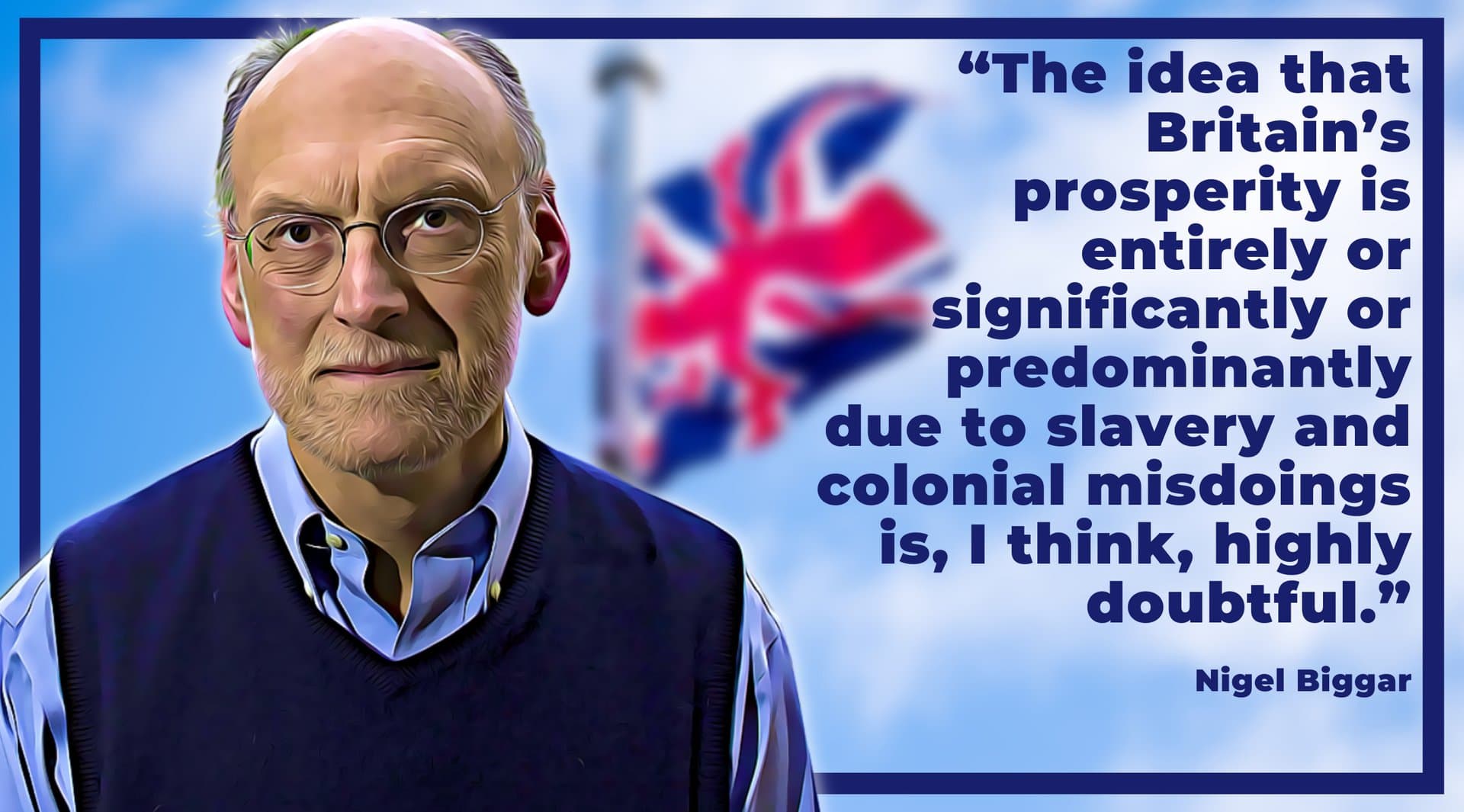It’s clear that across culture, politics, and the media, an orthodox view of British colonialism has been established. The British Empire was a racist project which exploited its colonies for economic gain. Britain’s former colonies have never recovered from these crimes. Britain owes reparations to them as a result but can never truly be forgiven for its original sin of colonialism and slavery. The wealth of the City of London, and indeed the nation, was built on the back of this exploitation. It’s a common narrative. But is it true?
Nigel Biggar, Emeritus Regius Professor of Moral and Pastoral Theology at the University of Oxford, believes the legacy of the British Empire is more complicated than many believe. He has recently published a book, Colonialism: A Moral Reckoning, which seeks to address the moral and ethical questions associated with British colonial adventure. He sat down with Disruption Banking to discuss the economic legacy of the British Empire.
Let’s start with the first point: was the British Empire exploitative? Biggar noted that the term itself “requires some thinking about […] the question of when economic activity becomes oppressive or exploitative, or when economic relations are fair enough, often depends on circumstances.” He did accept that certain British enterprises, such as the East India Company, “acted in a pretty unscrupulous, rapacious way” but also pointed out that “in that period in India, lots of Indians were being rapacious and unscrupulous too so it’s not obvious to me that the British were any worse.”
Enterprises back in Britain at the time, too, were hardly known for their enlightened views on employee protection or welfare. In other words, the idea that the British Empire was a uniquely exploitative project grounded in racism and evil doesn’t really chime with the wider circumstances of the era, Biggar believes. He also noted that those who wish to take a balanced and objective approach to the question of Britain’s alleged exploitation should “set against the ill-effects of the East India Company, the benefits of the peace that was imposed by the company which enabled the economy to prosper.”
A corporation like no other, the East India Company was a trading corporation formed to trade in the Indian Ocean region, eventually colonising large chunks of India, as well as parts of Southeast Asia and Hong Kong.https://t.co/Hm1FrMzNA0
— #DisruptionBanking (@DisruptionBank) April 21, 2023
The East India Company in particular is now widely perceived to be a brutal and corrupt enterprise responsible for the oppression and enslavement of millions. To the extent that is true, Biggar highlighted that the actions of the EIC were not necessarily condoned by the British state, let alone British citizens. “Lord Cornwallis came in in 1786 and he was determined to reform the company and remove corruption,” Biggar said. “Among other things, he ensured agents of the company were paid better, so they wouldn’t have to run schemes on the side.”
On the issue of slavery, too, it is far from obvious that this was a crime for which the nation should bear responsibility. “The number of people involved in investing in the slave trade and making profits out of it – I don’t know what the number is, but we’re talking about a small minority of British citizens,” Biggar told Disruption Banking. “And the British state itself was not involved directly; it was all private enterprise.”
“The British were then amongst the first peoples in the history of the world – let me repeat that: in the history of the world – to repudiate slavery. The British Empire led the way over the following 150 years to suppress slavery everywhere from Brazil to Indonesia,” Biggar added. As he also highlighted, after the abolition of the slave trade, the anti-slavery department became the biggest department in the Foreign Office and “something like 13% of the total manpower of the Royal Navy was devoted to stopping slave trading from West Africa across the Atlantic.”
Bigger further noted that “one economist has calculated that, in the roughly fifty-year period from 1816-67, Britain spent as much suppressing the transatlantic slave trade as they had earned in the fifty years before abolition.” Those who advocate for the payment of reparations should consider if they might have already been paid.
Partly because of this, Biggar rejects the idea that the wealth of modern Britain is somehow illegitimately built on the ill-gotten gains of its ancestors. “If you have a narrative about colonial history that is entirely negative, that colonialism equals slavery, then it follows that the proceeds are immoral. But the narrative that the Empire was simply a negative litany of racism, oppression, and exploitation is a false narrative,” Biggar said. It doesn’t necessarily follow that wealth derived during the colonial era is immoral or grubby.
There is also the more practical argument that it is simply impossible to calculate how much, if any, of the modern British economy derives from Britain’s colonial past. “There can be no doubt to my mind that some of the wealth and resources from the Empire spurred our industrial development and business, and some of that would have derived from slave trading,” Biggar said. “But there’s no consensus that it was more than a modest contribution, and many other factors would have contributed to it as well.”
“The idea that Britain’s prosperity is entirely or significant or predominantly due to slavery and colonial misdoings is, I think, highly doubtful.”
Biggar also thinks that this argument works both ways. In the same way it is impossible to trace Britain’s current economic standing to the colonial legacy, at least with any accuracy, it is similarly futile to try and work out the extent to which former colonies may have been economically hindered by the colonial project. “200 years has passed and those living in former colonies have been shaped by all sorts of events, not just slavery and slave trading,” Biggar pointed out.
“According to World Bank data, in 2020, Barbados, which is a post-slavery society, was doing better on average in terms of literacy, life expectancy, and gross national income than the citizens of Nigeria,” Biggar argued. “Nigeria being the place where Africans enslaved other Africans and then sold them to Europeans. So, the descendants of slaves, at least in Barbados, are doing better than the descendants of slave traders in Nigeria.”
"The British Empire was built on exploiting the resources and people of colonized countries. The legacy of colonialism continues to have a devastating impact on many nations, including India." – Kofi Annan
— Amit Goel (@amitTwitr) April 16, 2023
Given all of this, why does the British Empire, pretty much uniquely, attract such condemnation? Biggar believes there might be financial interests at play from some of those calling for reparations: “I’m sure many of those clamouring reparations really believe they deserve them, so I don’t want to be unkind to them, but let’s be clear: there’s a financial motive here.” Others may simply enjoy the feeling of superiority that comes from criticising the actions of their predecessors. “We all like being on our moral high horses, looking down on other people,” Biggar said.
The fact that British and European colonialism is targeted above the dozens of other colonial projects suggests that political considerations are also at play. The alleged “shame” of Britain’s colonial past has become a useful battering ram for those seeking to destabilise modern British political and cultural life; one deployed by everyone from the Chinese Communist Party to Vladimir Putin.
“Empire has been a fact of life from ancient times, long before white Europeans did it” Biggar said. “The people of Mesopotamia, Arabs, Chinese, Comanche, and Zulus, and lots of other non-white people have all done empire and colonialism. So that raises the question: why focus on the Europeans and Brits?”
“It’s quite clear to me that the current obsession with Western and British colonialism is politically motivated.”
Author: Harry Clynch











